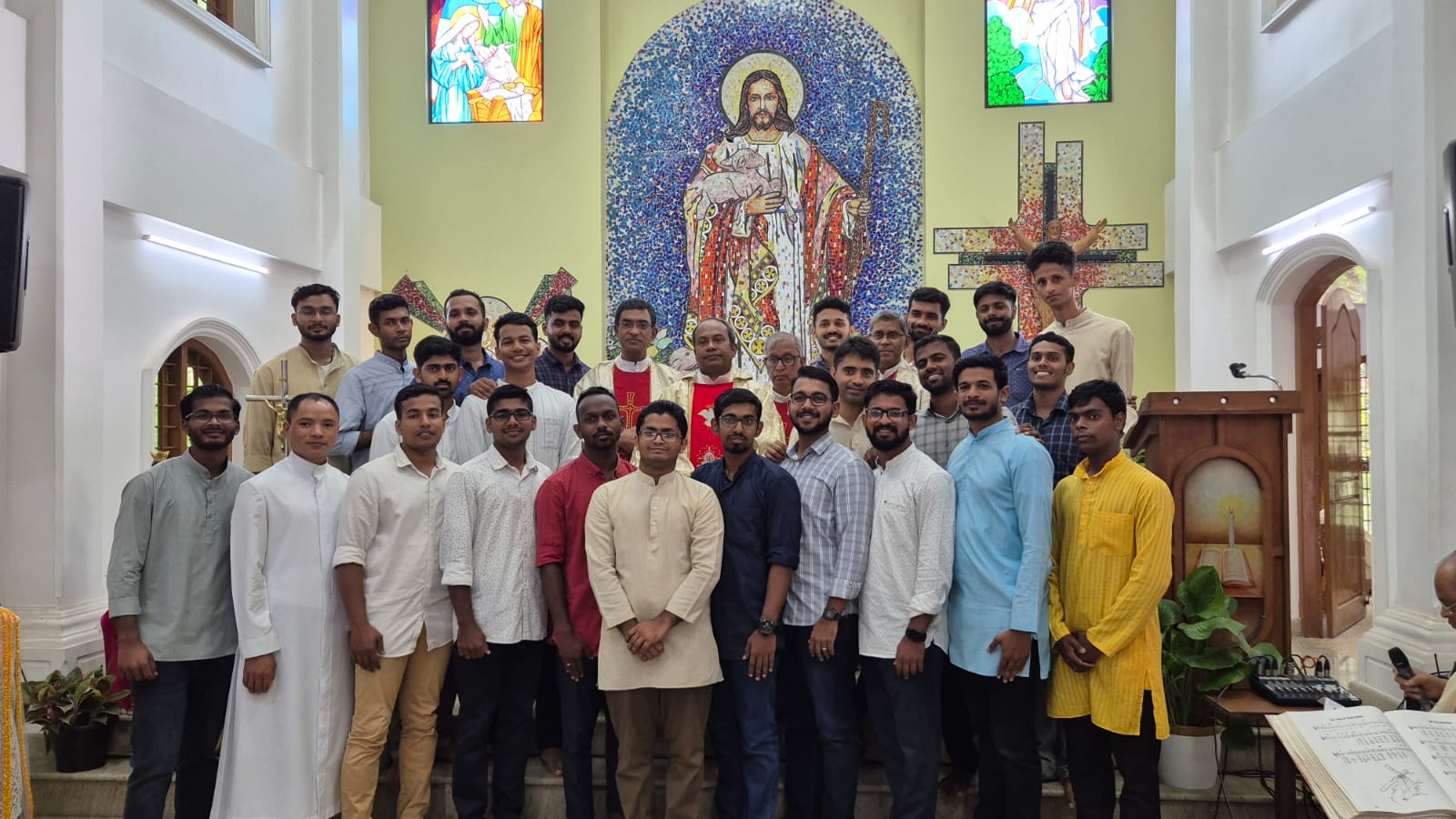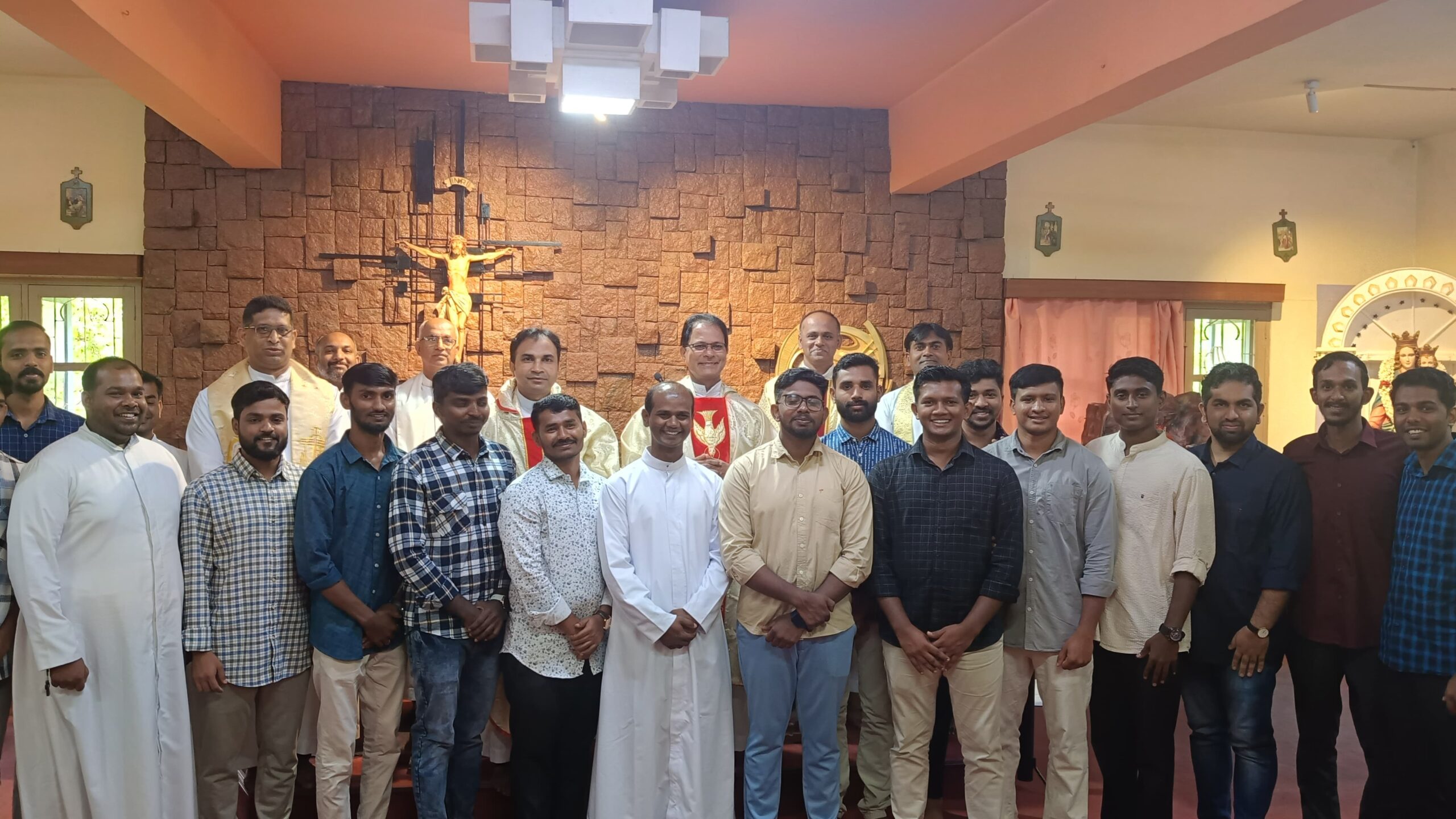
THE SPIRITUALITY OF WORK: A CALL TO LIVE THE MISSION
We celebrate the Feast of St Joseph the Worker on 1st of May. It was Pope Pius XII who instituted
the feast of St Joseph the Worker in 1955 to foster a deep devotion to the Saint among Catholics
and in response to the “May Day” celebrations for workers sponsored by the Communists. This
feast extends the long relationship between St Joseph and the cause of workers in both Catholic
faith and devotion. Beginning from the Book of Genesis, the dignity of human work has long been
celebrated as a participation in the creative work of God. Through work humankind both fulfils
the command found in Genesis to care for the earth (Gen 2:15) and to be productive in their
labours. Saint Joseph, the carpenter and foster father of Jesus, is but one example of the holiness
of human labour. This silent saint, who was given the noble task of caring and watching over the
Virgin Mary and Jesus, now cares for and watches over the Church and is a model for the dignity
of all human work. Drawing inspiration from St Joseph and the teaching of the Church let us
reflect on the beauty and spirituality of work that can instil deeper in us the spirit of work that
Don Bosco our Father and Founder has bequeathed to us.
Work and Spirituality
There is a widely accepted separation which people tend to make between work and spirituality.
To this end they even appeal to the Word of God to point out the futility of and dissatisfaction
with toil: “Vanity of vanities! All is vanity. What does man gain by the toil at which he toils under
the sun?” (Eccl 1:2-3). St John Paul II boldly speaks of a spirituality of work in his encyclical
Laborem Exercens (1981): “By enduring the toil of work in union with Christ crucified for us,
man in a way collaborates with the Son of God for the redemption of humanity. He shows himself
a true disciple of Christ by carrying the cross in his turn daily in the activity he is called to
perform” (LE 27). Work can be defined as any mental or physical activity performed for or
without compensation, which can be carried out in various settings such as a formal workplace
or at home. In the Christian context, spirituality refers to our relationship with God and the way
we try to strengthen that bond. Combining these two concepts, “the spirituality of work” implies
that every human activity offers an opportunity to strengthen our relationship with God.
The Creative and Redemptive Work of God as Prototype
Sacred Scripture begins with an account of God’s work of creation of the world in six days (Gen
1:1-31). The Bible – especially in the Psalms, Wisdom Books and the New Testament – expresses
deep admiration and reverence for the intricacies and vastness of God’s work. God’s creation
constituted a gift and a task for the people of Israel. They believed that it should be cherished,
developed and cultivated to meet the needs of the entire community. Created in God’s image and
likeness, human beings received a “mandate” “to subdue, to dominate the earth” and shares by
his work in the activity of the Creator. All work that sought to benefit the greater good was
considered noble and valuable in its own right. Jesus, while sharing our human condition
completely, worked as a carpenter in his foster father’s shop. Through his own labour and sweat,
he raised the dignity of human work to a higher level. After his Baptism in the River Jordan Jesus
began the work of proclaiming and revealing the Kingdom of God through the power of the Holy
Spirit. His gathering of disciples, his teachings, miracles and parables were all fruits of this work.
Finally, his work of redemption of humanity and the entire creation culminated in his death on
the cross and his resurrection.
The Spirituality of Work in the Life and Teaching of the Church
The Compendium of the Social Doctrine of the Church would consider work as “representing a
fundamental dimension of human existence as participation not only in the act of creation but
also in that of redemption” (Compendium #263). Against idleness, projected by the socialists as
a virtue, Pope Leo XIII wrote in Rerum Novarum (27): “If they (socialists) promise the poor in
their misery a life free from all sorrow and vexation and filled with repose and perpetual
pleasures, they actually impose upon these people and perpetuate a fraud which will ultimately
lead to evils greater than the present.” Idleness, in those times as even today, fosters slothfulness,
gluttony, drug abuse, mental problems and the consumption of pornography. This stand of the
Church was based on the self-attestation of St Paul in 2 Thessalonians: “We were not idle when
we were with you, we did not eat anyone’s bread without paying, but with toil and labour we
worked night and day” (2 Thess 3:7-8). Work promotes growth in virtues like obedience,
patience and perseverance. St Benedict had a simple motto for his order: Ora et labora (“work
and prayer”). If work has been integrated into and lived as a spirituality in contemplative life,
even more should it be a spirituality for us members of an active religious congregation.
Work, a Path to Transcendence
“By the sweat of your brow, you shall eat bread” (Gen 3:19). These words refer to labour that has
become a defining aspect of human work since the Fall. Human work has the potential to help
people become more fully human, mature, develop empathetic relationships with one another
and appreciate creation. Work, in addition to contributing to the common good, also paves the
way to enhance the glory of God. Activities that involve self-sacrifice and aimed at serving God
and humanity, whether work or any other, are inherently creative. This is because, by their self-
sacrificing work, people can transcend themselves and strive for something greater than mere
self-gratification.
St John Paul II in his apostolic exhortation Redemptoris Custos on the person and mission of St
Joseph in the life of Christ and of the Church, wrote: “Work was the daily expression of love in
the life of the family of Nazareth. The Gospel specifies the kind of work Joseph did in order to
support his family: he was a carpenter”. This simple word sums up Joseph’s entire life. The
Church has emphasised this by instituting the liturgical memorial of St Joseph the Worker on
May 1. “St Joseph is the model of those humble ones that Christianity raises up to great destinies;
… he is the proof that in order to be a good and genuine follower of Christ, there is no need for
great things – it is enough to have the common, simple and human virtues, but they need to be
true and authentic” (Paul VI, Discourse 19 March 1969).
The Need for a Spirituality of Work
Work, despite its nobility, harbours a danger in the eyes of the Church. It is a prime way of
creating wealth, and so presents the risk of serving or filling the human horizon with a lust for
wealth and possessions, which grasps the human heart, choking out the higher and more
fulfilling call to know, love and serve God the Creator by serving each other. A spirituality of work
is, therefore, vital for human beings. It is both a gift and a need, especially for those who are
involved in special ministries in the Church, and in particular in our case as consecrated persons
dedicated to pastoral ministry on behalf of the young. The spirituality of work will serve as a
constant reminder of the importance of God’s plan for humanity in our work. To prevent work-
related tragedies and avoid future hazards, people must understand their purpose and role as
cooperative agents of God’s creative power. It is important to recognize that humans with their
own limitations and inadequacies are invited to join God in a co-creative role. Their ultimate goal
is to shape the world around them and contribute to their ultimate purpose – to give praise and
glory to God. All this would be realised only from a person deeply rooted in and constantly
connected to God, the reason for all our works. This spirituality of work is a prerequisite for us
Salesians to live our charism of Da mihi animas caetera tolle.
Salesian, a Protagonist of the Spirituality of Work
“This is the field of your work. Make yourself humble, strong, and energetic,” the Lady told John
Bosco in his dream at the age of nine. Don Bosco was a practical and enterprising individual, a
tireless and creative worker with a profound spirituality. Anyone reading his life would be
amazed at the volume of work he accomplished. He completed his pilgrimage on earth, leaving
behind a great movement that worked and still continues to work for the salvation of young
people. His doctor, describing the cause of his death, stated that he was like a candle burnt out;
his end was caused not by any sickness as such, instead by exhaustion from relentless work. Fr
Rinaldi often noted Don Bosco’s imperturbable calm amid life’s troubles. All the testimonies
about this period of his life concur in assuring us that he was always calm and was fatherliness
personified. This calmness and fatherliness had their foundation in his life of union with God.
Prayerfulness and thoughtful calm ideally characterised the life of Don Bosco, which should
characterize every Salesian.
St Francis de Sales expounds the ecstasy of understanding, affection, and action in his Treatise
on the Love of God. This third kind of ecstasy, namely, the ecstasy of action, proceeds from the
meeting of the practical with the supernatural. This ecstasy is the soul of apostolic charity in Don
Bosco. Don Bosco thus brought the supernatural into the practical realm in his life. He was a
practical and enterprising person, a tireless and creative worker, animated by a permanent and
profound interior life. The life programme left by Don Bosco to his sons remains “Work and
Temperance”. Don Bosco wanted it to be the hallmark of his sons and daughters. It was work
“sanctified” by prayer and union with God, and not the feverish activity by which people drown
in activity, making it a kind of drug for themselves. “It is our fervent wish,” Don Rua stated once,
“that this kind of well-understood activity should not be the privilege of a few, but the virtue of
each and every member of the Salesian Family.”
The Special General Chapter of 1971-72 maintained that “the first predominant element of the
Salesian spirit is its prodigious activity, both collective and individual”. For the Salesian who is a
religious “in maniche rimboccate” (with rolled-up sleeves), it taught that work is at once
mysticism, asceticism and the requisite for a free and joyful consecration to God in chastity,
poverty and obedience. The search for quiet and cosy well-being would spell his death. The
Salesian is one who gives himself to his mission with tireless dedication. Work is his asceticism
because he accepts its harsh demands and is ready to endure everything – heat and cold, thirst
and hunger, fatigue and contempt – whenever the glory of God and the salvation of souls are at
stake.
The great disease of many who are devoted to the service of God is the restlessness and excessive
ardour they bring to external activities. If we are not careful, we run the risk of following the
movement of the world which allows itself to be dragged along in the whirlwind of business, a
victim of the evil which St Bernard already called “the disembowelling of the soul”. In such a state,
there is never a moment to reflect, to discover oneself, to know where one is going, to bring one’s
daily existence in prayer to God. May we, the Salesians of today, continue to give an example of
initiative and great activity, but one that is always and everywhere the result of true, prudent,
constant zeal, supported by solid piety which truly can be termed the spirituality of work.
May the spirituality of St Joseph the silent worker, who loved Jesus more than anyone or
anything, spur us to work ceaselessly for the young, making our work an expression of our
dedication to youth embedded in our bonds of love and devotion to God.
-
LENT: A JOUR...
29 March 2025 -
“ANCHORED IN...
14 February 2025 -
JUBILEE 2025...
08 February 2025 -
THE BIRTH OF...
08 January 2025 -
MONTH OF NOV...
13 November 2024 -
REDISCOVERIN...
13 October 2024 -
SYNODALITY A...
13 September 2024 -
INDEPENDENCE...
04 August 2024 -
THE SACRED H...
04 August 2024 -
THE SPIRITUA...
04 August 2024










